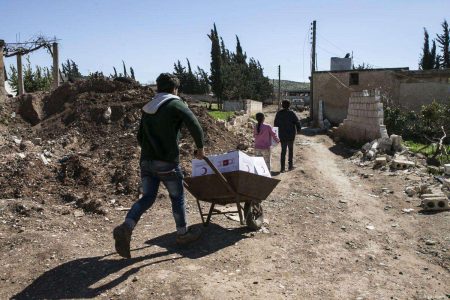
The UK cuts aid to northeastern parts of Syria citing fear of funding the Islamic State
The British government has cancelled cash transfers to humanitarian organisations in the northeast of Syria, for fear that money meant to help refugees could end up in the hands of Daesh.
Although the international coalition declared Daesh defeated last month, remaining militants scattered across the east of the country have continued a low-level insurgency, claiming the lives of several US-backed fighters in guerrilla style attacks.
The UK’s Department for International Development (DFID) said the decision was a precaution, adding that it was not aware of any money actually being diverted towards remaining militants.
“We have suspended the use of UK aid through cash transfers in northeast Syria following the territorial defeat of Daesh,” a spokesperson for DFID told the National. “This is a precautionary measure due to the risks associated with the dispersal of Daesh members. UK aid will still give food, shelter and healthcare to those people in Syria in desperate need.”
A group of 58 international NGOs said they were “extremely shocked” at the decision, criticising it as a “hasty reactionary stance” that was “impossible to justify”.
DFID has budgeted $198 million for support to Syria in its 2019/2020 budget, $52 million destined for the northeast including $5 million previously earmarked as cash assistance. Direct cash transfers to displaced people have grown as a preferred method of aid deliverance in recent years, with agencies citing its greater efficiency, lower implementation costs and its ability to preserve the dignity and autonomy of recipients.
Aid agencies have said they are struggling to provide medical care and shelter for the more than 60,000 refugees now at the Al-Hawl camp in the northeast of Syria, two thirds of whom are children. Many have sustained severe injuries from the Syrian Democratic Forces’ (SDF) battle against militants in the tent-city of Al-Baghouz, the last sliver of Daesh territory.
Footage from the camp has shown thousands of new arrivals forced to sleep in the open, despite the bitter cold. Last month, charities said that more than 400 children were being treated for moderate acute malnutrition in the camp; hundreds have already died from the dire conditions.
However, according to Fe Kagahastian, a cash and markets specialist deployed to the Syria response by NORCAP-CashCap, the recent change in UK aid policy was the result of the public backlash to the prospective return of Daesh bride Shamima Begum.
“The media focus on one Daesh-affiliated woman [Begum] effectively strips tens of thousands of Syrians – who are displaced after fleeing ISIS [Daesh] violence to begin with – of a more dignified form of assistance,” she said.
Cutting cash distributions also has negatively affected the burgeoning markets that have been set up in the camp, Kagahastian said. “The small shopkeepers, traders, bakers, water and fuel suppliers, transportation service providers are also now at risk of losing their businesses as displaced Syrians lose their purchasing power.”
Humanitarian agencies working in the region have attempted to reassure other donors, fearing that if they also decide to restrict cash assistance, such critical stabilisation efforts will stop.
“DFID’s decision to ban cash assistance in northeast Syria will deprive tens of thousands of Syrians of existing and planned assistance,” the group of NGOs wrote to other foreign donors. “Suddenly stopping this essential life-saving and dignity sustaining programming would have both immediate and long-lasting implications.”
Source: MEM





